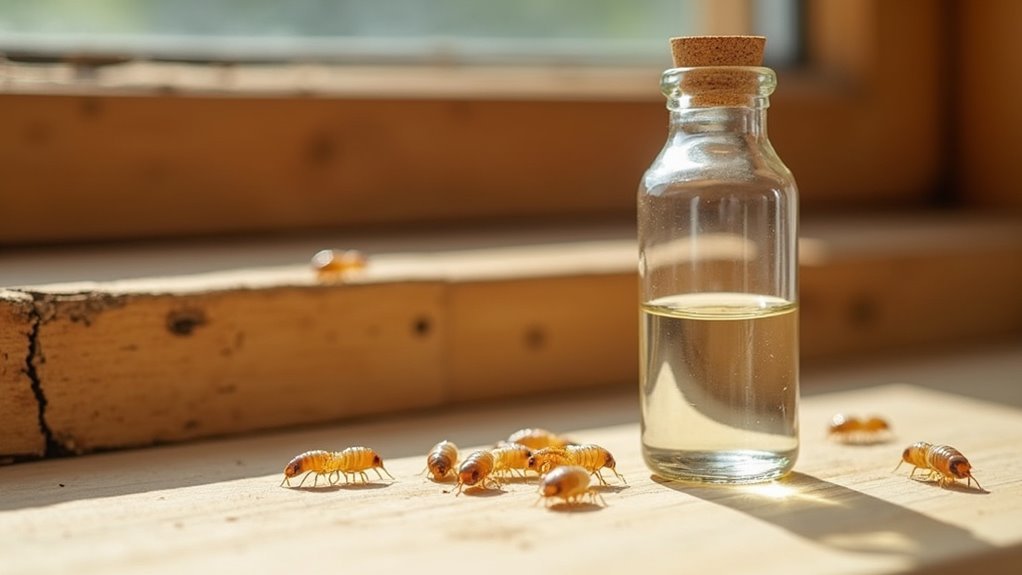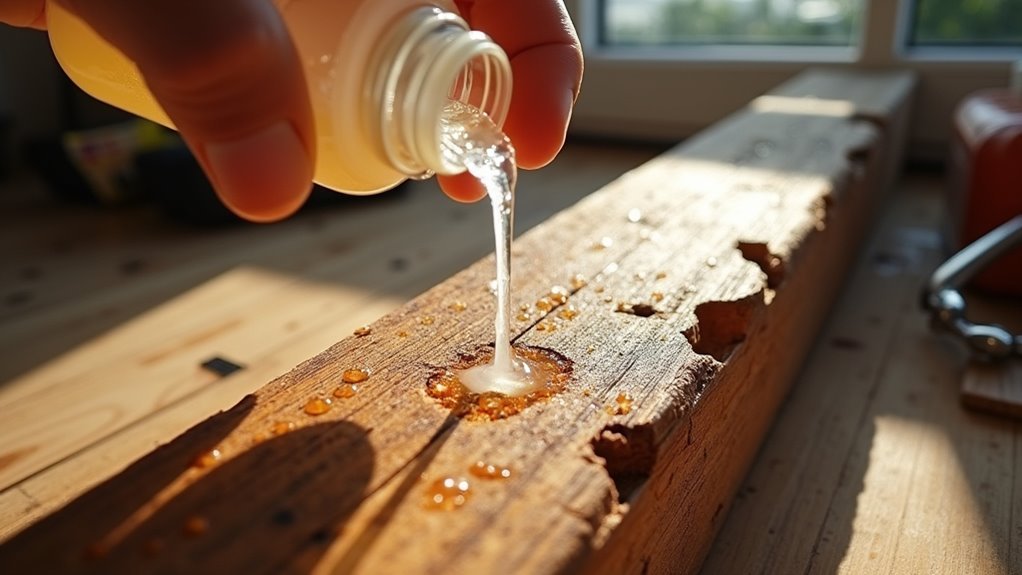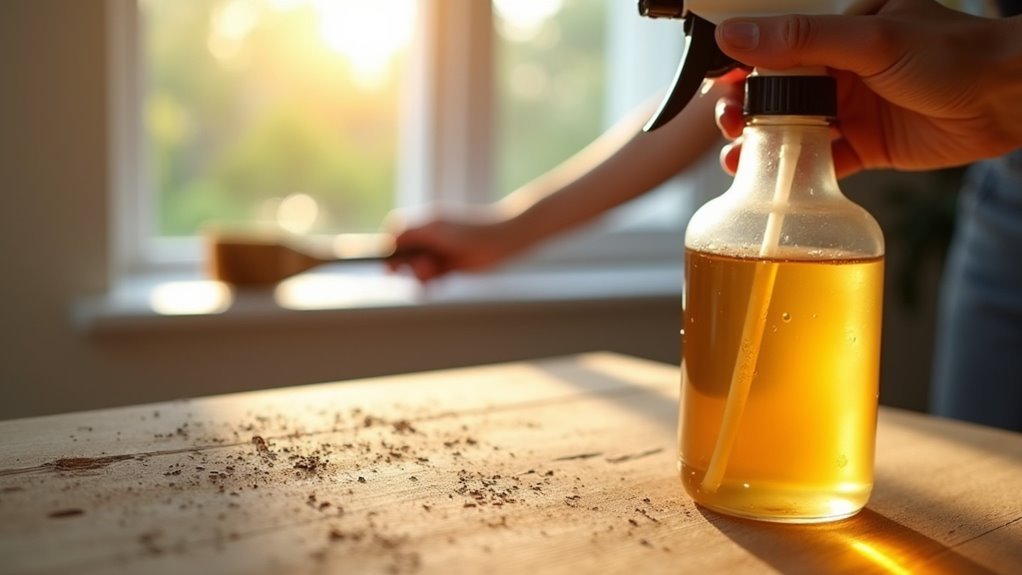You can kill termites at home by mixing equal parts white vinegar and water in a spray bottle, then applying it directly to visible termite trails and infested wood surfaces. The acetic acid attacks their exoskeletons, causing rapid dehydration and death within minutes. For enhanced effectiveness, add lemon juice to increase potency. Target mud tubes along foundations and spray outdoor areas every two days, indoor spaces weekly. However, vinegar won’t penetrate deep infestations and requires constant reapplication, so larger colonies may need more thorough treatment approaches.
Understanding How Vinegar Affects Termite Biology

When termites encounter vinegar, the acetic acid immediately begins attacking their delicate exoskeleton, causing rapid dehydration that leads to death within minutes of direct contact.
You’ll find that this acidic solution breaks down the proteins in their protective outer shell, making it impossible for termites to maintain proper moisture levels.
The effectiveness extends to termite eggs when you spray vinegar directly on them. The high acidity destroys the protein structures that protect developing termites, preventing them from hatching.
Vinegar’s high acidity penetrates termite egg shells, destroying protective proteins and preventing larvae from developing into mature insects.
Additionally, termites breathe through their exoskeletons, so soapy vinegar mixtures can suffocate them by blocking these breathing passages.
However, vinegar’s limitation becomes apparent with larger termite infestations. While it’ll kill visible termites, it can’t penetrate deep into wood to reach hidden colonies.
Preparing Effective Vinegar Solutions for Termite Control
Since you understand how vinegar damages termites at the biological level, you’ll need to create the right concentration to maximize its effectiveness. For effective solutions, combine equal parts white vinegar and water in a spray bottle.
Add lemon juice from two lemons plus half a cup of vinegar for enhanced potency against the exoskeletons of termites. Choose white vinegar over apple cider varieties due to its higher acidity levels.
Target infested wood and visible termite trails directly with your solution. Apply consistently – spray outdoor areas every two days and indoor spaces weekly to maintain pressure on termite populations.
These home remedies for termites require regular reapplication since vinegar doesn’t provide long-term residual effects or penetrate deeply into wooden structures for complete termite control.
Direct Application Methods for Visible Termite Infestations

Three direct application methods will help you tackle visible termite infestations with maximum impact.
First, spray your vinegar solution directly onto visible termite trails where you see active movement. This direct application kills termites on contact by disrupting their exoskeletons.
Second, target affected areas like infested wooden furniture and small entry points where termites enter your home. Focus on cracks and crevices where colonies establish themselves.
Third, treat wooden structures systematically by applying white vinegar to all accessible surfaces showing termite damage.
Remember that regular application is essential for success. Spray outdoor infestations every two days and indoor areas weekly to maintain consistent pressure on remaining termites and prevent reinfestation.
Targeting Termite Entry Points and Mud Tubes
Although direct spraying works well for visible termites, you’ll achieve better long-term results by focusing your vinegar treatments on the specific pathways termites use to access your home.
Start by identifying visible mud tubes along your foundation, walls, and basement areas. Fill your spray bottle with concentrated vinegar and apply it directly to these tubes to disrupt termite access routes.
Don’t overlook foundation cracks where termites commonly enter. These targeting treatments should concentrate on any exposed wood near entry points.
Pest control experts recommend regular inspection and reapplication at termite entry points to maintain pressure on colonies. Consistent vinegar application along mud tubes and vulnerable areas helps eliminate termites and reduces reinfestation chances effectively.
Treating Infested Wood Surfaces With Vinegar Mixtures

Once you’ve identified infested wood surfaces, you’ll need to create an effective vinegar-lemon mixture that can kill termites on contact while protecting your wood’s finish.
You’ll want to establish a consistent application schedule since termites often return to previously infested areas, requiring regular retreatment every few days.
It’s essential that you dilute your mixture properly to prevent the high acidity from damaging protected wood surfaces while still maintaining the solution’s pest control effectiveness.
Vinegar-Lemon Wood Treatment
When termites have invaded your wooden surfaces, a simple vinegar-lemon wood treatment can serve as your first line of defense against these destructive pests.
Combine two lemons’ juice with half a cup of white vinegar in a spray bottle for effective application. The acetic acid in vinegar disrupts termite exoskeletons and dehydrates them, while lemon’s additional acidity enhances effectiveness.
Apply the vinegar-lemon mixture directly onto visible termite trails and areas where termites infest wood, ensuring thorough coverage.
You’ll need to reapply the solution every few days for outdoor areas and weekly for indoor treatments to maintain pressure on termite populations.
While vinegar kills termites on contact, this isn’t a complete solution. Significant infestations typically require professional pest control for complete eradication.
Application Frequency Guidelines
Proper timing separates effective vinegar treatments from wasted efforts when targeting termite-infested wood surfaces. Your application frequency directly impacts termite control success, as vinegar’s effects don’t last long without consistent reapplication.
| Treatment Area | Application Frequency | Purpose |
|---|---|---|
| Indoor infested wood | Weekly | Maintain termite pressure |
| Outdoor wood surfaces | Every 2 days | Combat higher activity |
| Visible termite areas | Daily during active infestations | Kill on contact |
| Preventive treatments | Bi-weekly | Ongoing protection |
You’ll need to spray the vinegar mixture more frequently outdoors where termite activity increases. For maximum effectiveness, target visible termites with daily applications until you notice reduced activity. Remember that vinegar won’t penetrate deeply into wood colonies, so consistent surface treatment becomes essential for controlling these persistent pests through repeated contact exposure.
Wood Damage Prevention
Since termites feed directly on wood cellulose, treating infested surfaces requires careful balance between effectiveness and preservation. Vinegar can kill termites through targeted treatments while protecting your wood structures when applied correctly.
White vinegar and apple cider vinegar both work effectively, but proper dilution prevents finish damage.
- Dilute vinegar with water to reduce acidity while maintaining termite-killing properties
- Apply white vinegar mixed with lemon juice for enhanced wood penetration
- Focus treatments on visible infestation areas to eliminate active termites
- Use sparingly to prevent damage to wood finishes and surfaces
- Maintain ongoing monitoring of treated areas for continued termite activity
These effective strategies help prevent further wood damage when combined with thorough pest management.
Regular treating wood surfaces creates sustained pressure on termite populations while preserving structural integrity.
Application Frequency and Timing for Maximum Effectiveness
The timing and frequency of your vinegar applications directly determine how effectively you’ll control termite populations around your property.
For outdoor applications, you’ll need to spray every two days to maintain constant pressure on colonies and achieve maximum termite prevention.
When you treat indoor infestations, weekly applications work best—focus on visible trails and entry points where termites actively travel.
White vinegar’s higher acidity makes it superior to apple cider vinegar, requiring less frequent treatments.
However, consistent reapplication remains essential since vinegar only targets visible termites without penetrating hidden colonies or eggs.
To eliminate termites more effectively, consider mixing vinegar and lemon juice for enhanced potency.
This application frequency guarantees the effectiveness of vinegar while preventing termites from establishing new colonies.
Limitations of Vinegar Treatment and When to Seek Professional Help
While vinegar can kill termites you see directly, it won’t reach the hidden colonies or eggs that fuel ongoing infestations.
You’ll find yourself reapplying vinegar frequently without achieving long-term protection, and excessive use may actually damage your wooden surfaces.
Professional pest control becomes essential when you’re dealing with significant infestations that require thorough treatment targeting entire termite colonies.
Vinegar’s Effectiveness Limits
Although vinegar can kill termites on contact through its acidic properties, you’ll quickly discover its significant limitations when dealing with real infestations.
While DIY methods like vinegar provide temporary relief for visible termites, they can’t eliminate entire termite colonies hidden within your home’s structure.
Vinegar’s effectiveness limits include:
- Inability to penetrate deep into walls where termite colonies nest
- No residual effects, requiring constant reapplication for any impact
- Potential wood damage from repeated acidic exposure over time
- Ineffectiveness against termite eggs, allowing future generations to emerge
- Limited reach compared to professional long-term termite treatment solutions
When you apply directly to visible termites, vinegar works temporarily.
However, for thorough home pest control and effective preventative measures against established infestations, professional termite treatment becomes essential.
Professional Treatment Benefits
When facing a serious termite infestation, professional pest control services deliver extensive solutions that vinegar simply can’t match.
Professional treatment benefits include the ability to eliminate entire termite colonies, including hidden nests that DIY methods can’t reach. While vinegar only targets visible infestations, professionals provide thorough solutions using advanced techniques for complete eradication.
You’ll receive long-term protection through targeted treatments and preventive measures that markedly reduce the risk of reinfestation.
Professional services offer tailored treatment plans based on your infestation’s severity, addressing colonies containing tens of thousands of termites.
This thorough approach delivers peace of mind that vinegar treatment simply can’t provide, ensuring your property remains protected against future termite damage through proven, effective intervention methods.
Frequently Asked Questions
How to Use Vinegar to Kill Termites?
Mix two lemons’ juice with half a cup of white vinegar in a spray bottle. You’ll spray it directly on termite trails, infestations, and entry points, reapplying every two days outdoors.
What Is the Most Effective Home Remedy for Termites?
You’ll find boric acid the most effective home remedy for termites. It penetrates deeper than vinegar, poisoning entire colonies when termites ingest it. Apply powder around infested areas for better long-term results.
Will Dawn Dish Soap Kill Termites?
Yes, Dawn dish soap will kill termites on contact by blocking their breathing pores. You’ll need to spray it directly on them, but it won’t eliminate entire hidden colonies.
Will Hydrogen Peroxide Kill Termites?
You’ll find hydrogen peroxide can kill termites on contact by damaging their exoskeletons. However, it won’t reach hidden colonies or eggs, so you’ll need to combine it with other pest control methods.
In Summary
You’ve learned several vinegar techniques to combat termites, from direct applications to targeted treatments of entry points and infested wood. While vinegar can help with minor infestations and visible termites, don’t rely on it as your only solution. If you’re dealing with extensive damage or widespread colonies, you’ll need professional intervention. Remember that consistent application and proper timing are essential, but vinegar won’t eliminate established termite colonies completely.





Leave a Reply